
Indicator scoreboard
EMU - December industrial output rose 0.8 percent but dropped 4.1 percent when compared with last year. Energy goods output rose 1.8 percent followed by durable consumer goods, up 1.4 percent, and non-durable consumer goods, up 0.8 percent. Intermediate goods output fell 0.6 percent and capital goods slipped 0.2 percent. When compared with last year, intermediate goods fell 8.4 percent, durable consumer goods fell 5.9 percent, capital goods fell 5.2 percent and non-durable consumer goods fell 2.0 percent. Energy goods rose 5.2 percent.
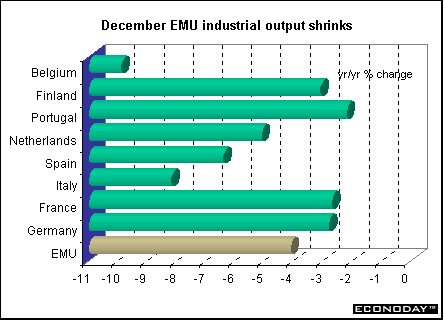
December merchandise trade surplus with the rest of the world was E8.7 billion, way above the deficit of E0.7 billion a year earlier. Exports fell 4 percent on the year, while imports plunged 16 percent. On a seasonally adjusted basis, the surplus rose to E7.2 billion compared with a surplus of E6.6 billion in November 2001. Seasonally adjusted exports were unchanged but imports fell 1 percent.
Germany - January wholesale prices jumped 1.2 percent but rose 0.2 percent when compared with last year. Seasonal food prices (fresh fruit and vegetables) rocketed 18 percent and 16 percent on the year. Excluding seasonal food prices, wholesale prices rose 0.5 percent on the month, but were down 0.4 percent on the year. The rise in WPI excluding seasonal foods was due in part to higher energy prices, which rose 2.7 percent. Excluding oil products, wholesale prices rose 1.1 percent on the month and 0.8 percent on the year.
December manufacturing orders were revised down to an increase of 4.2 percent from the originally reported increase of 5 percent. Foreign orders were revised down to an increase of 3.4 percent from an original 4.5 percent, while domestic orders were revised down to an increase of 4.9 percent from 5.6 percent. Pan-German capital goods orders were revised up to an increase of 6.5 percent from 6.2 percent, basic goods were revised down to an increase of 3 percent from 4.9 percent, and consumer and durable goods orders were revised down to a decline of 0.7 percent compared to an increase of 1.2 percent initially reported.
December seasonally adjusted total industrial output was revised downward to an increase of 0.4 percent from the originally estimated increase of 1.9 percent. Similarly, west German output was revised down to an increase of 0.5 percent from the originally reported 1.9 percent and east German data were revised down to a drop of 0.6 percent from an increase of 0.7 percent. Industrial production excluding construction - the figure used to calculate eurozone industrial output - was revised down to no change from an initial increase of 1.7 percent.
France - Fourth quarter seasonally and workday adjusted gross domestic product slipped 0.1 percent but was up 0.9 percent when compared with last year. Consumption growth slowed to 0.2 percent while business investment declined 0.2 percent. Public investment was also lower and household investment was flat, resulting in a 0.1 percent decline for total investment. Imports plunged 4.7 percent, outpacing a 3.8 percent drop in exports.
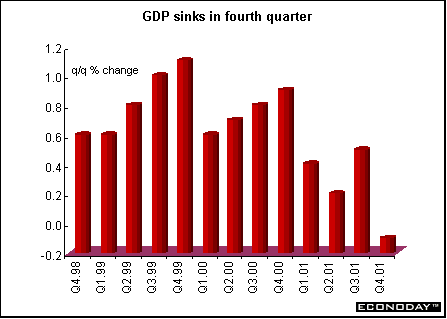
December seasonally adjusted current account surplus surged to E4.3 billion due to a sharp rise in revenues and favorable seasonal adjustments. The estimated merchandise trade surplus narrowed to E900 million from E1.9 billion, while the services surplus widened to E1.8 billion after dipping to E1.5 billion in November. Total imports rose 1.8 percent on the month, while exports fell back 2.2 percent.
January seasonally and calendar adjusted consumer spending on manufactured goods declined 0.4 percent but was up 1.2 percent when compared with last year. Spending fell in all main categories led by household durables, down 1.5 percent, and autos, down 0.8 percent. Excluding the auto sector (and medical products), spending was down 1.0 percent and only up 0.2 percent on the year.
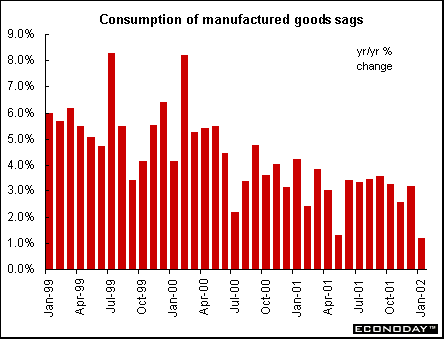
Italy - December industrial orders fell 8.6 percent when compared with last year. Domestic orders dropped 9.1 percent and foreign orders sank 7.9 percent. Domestic orders account for around 62 percent of the overall index, with foreign orders making up about 37 percent. Seven of the ten product sectors declined with the steepest drops in the electrical and precision appliances sector, down 31.5 percent, and in the transportation sector, down 16.8 percent. Recently introduced seasonally adjusted data showed that December's orders gained 3.7 percent from November after a 0.3 percent rise in November from October. Domestic orders climbed 5.0 percent on the month, while orders from abroad rose 1.7 percent.
Britain - January seasonally adjusted retail sales volume declined 0.3 percent but rose 4.2 percent when compared with last year. The decline was led by other store sales, which were down 1.1 percent and household goods sales dropped 0.8 percent, while non-store retailing and repair sales were down 1.2 percent.
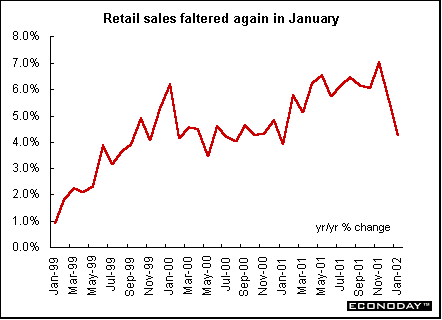
December global merchandise trade deficit increased to Stg3.182 billion, up from Stg2.838 billion in November. Goods exports fell to Stg14.328 billion from Stg15.012 in November, while imports eased back to Stg17.510 billion from November's Stg17.850 billion. The non-European Union goods trade gap was Stg 2.362 billion, up from Stg2.065 billion in November. The deficit with the European Union also widened to Stg820 million from Stg773 million in November, reaching its highest level since April 1999. Excluding oil and erratics, the December goods trade gap widened to Stg3.286 billion, up from Stg2.991 billion in November. Exports fell to Stg12.496 billion from Stg 12.999 billion in November, and imports edged down to Stg15.782 billion from Stg 15.990 billion in November.
Asia
Japan - December tertiary industry index rose 0.7 percent led by transport and communications companies and power utilities. The index rose 1.2 percent in 2001, less than the 2.7 percent increase in 2000. The tertiary index fell 0.5 percent when compared with last year. The all-industry activity index, which adds factory production and government spending to the tertiary index and is used as a proxy for gross domestic product, rose 1 percent in December. For all of last year, the index fell 1.3 percent, reflecting the biggest drop in factory production in a quarter century.
Americas
Canada - December manufacturers' shipments fell 1.8 percent, the third significant decrease in four months. Fifteen of 21 industries, representing 84 percent of total shipments, lost ground. Inventories fell 0.4 percent for the seventh consecutive decline, and finished product inventories dropped 1.0 percent. Despite the significant cut in shipments and the string of decreases in inventories, the inventory-to-shipments ratio leaped to 1.56, nearing its nine year high. Both unfilled orders and new orders also decreased in December. Unfilled orders dropped 1.6 percent, the fifth consecutive decline, while new orders finished the year down 2.5 percent.
December retail sales rose 1.6 percent and 5.8 percent when compared with last year. Consumers increased their spending in all retail sectors. The furniture sector led, jumping 3.9 percent. Automotive sales were up 2.0 percent, general merchandise up 1.8 percent, clothing up 1.6 percent and food up 1.1 percent.
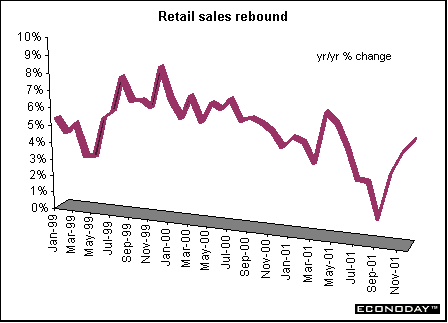
December merchandise trade surplus rose to C$4.5 billion from C$4.4 billion in November. Exports fell 1.2 percent for the eighth drop in 10 months. Imports declined 1.8 percent to their lowest level since July 1999. Merchandise exports to the United States fell slightly to C$26.8 billion while imports dropped 1.6 percent to C$20.0 billion. The trade surplus with the United States jumped 4.4 percent to nearly C$6.8 billion. The merchandise trade deficit with trading partners other than the United States deteriorated by nearly a quarter of a billion dollars to just over C$2.2 billion.
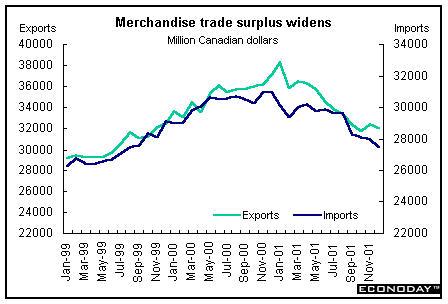


Last Week's Highlights • Global
Stock Market Indexes • Recap of Global Markets
• Currencies • Indicator
Scoreboard

The Bottom Line •
Looking Ahead
|